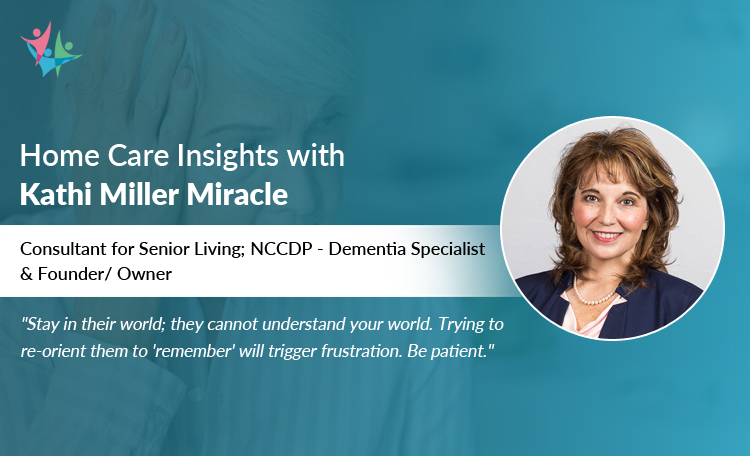In Conversation with Kathi Miller Miracle to Bring Her Insights on Dementia Support
Supporting seniors with dementia is like tending to a delicate garden, requiring patience and creativity. It involves preserving their old memories and helping them create new ones while ensuring their physical and emotional well-being. This care demands unwavering patience, empathy, and innovative techniques.
In senior care, cherished memories are nurtured through activities like reminiscence therapy, while new experiences tailored to individual interests, such as art, music, and nature outings, are introduced.
A holistic approach addresses their cognitive needs, physical health, nutrition, and social interaction. Upholding dignity is paramount; independence is encouraged, and preferences are respected.
Navigating the intricate landscape of dementia is undeniably challenging. Yet, with steadfast support, the focus remains on fostering meaningful connections and honoring the unique life story of each senior.
To shed some light on the same, we interviewed a home care industry expert to bring her perspective on caring for a senior with dementia.

Who Did We Interview?
Kathi Miller Miracle is a distinguished Consultant for Senior Living. With notable expertise as an NCCDP-certified Dementia Specialist and Certified Brain Training Specialist, Kathi has a wealth of knowledge.
Her extensive background as an experienced Executive Director in both For-profit and Nonprofit Organizations, coupled with her proficiency in team building, elder care, healthcare, and leadership, shines. Kathi holds a Master of Arts degree in Gerontology, with a specialized focus on Dementia and Elder Abuse, from the University of Northern Colorado, underscoring her dedication and passion for enhancing the lives of seniors.
Let’s explore our expert’s insights on providing support and ensuring the well-being of elderly individuals living with dementia.
Question 1: What, in your opinion, can caregivers do to support seniors with dementia?
First it is important to be as educated as possible. There are numerous resources to educate oneself about the dementia journey. Understanding this journey and knowing what to possibly expect, as well as how to handle the various behaviors, and how to communicate with a person with dementia, will make the dementia journey a smoother path to travel. In addition it is very important for the caregiver to understand how to take care of themselves. Caregiver burnout is real and if they do not care for themselves the person will not have the energy or endurance to care for the person with dementia.
Question 2: Do dementia patients need to make certain lifestyle changes to minimize the impact?
Research has shown that people can make lifestyle changes to help. Getting oxygenated blood to the brain is important. Cardio activities such as walking, bicycling, and swimming are important to add to a daily routine. Adhering to a healthy diet, such as the Mediterranean diet, is helpful. Minimizing alcohol, sugar, and fatty food intake should be considered. Exercising the brain through cognitive exercises is key to helping strengthen cognitive skills and creating new neuro-pathways. Cognitive exercising should be done at least 3 times per week.
Question 3: How should family members and caregivers communicate with dementia patients?
This depends on where the person is on their dementia journey. People in the ‘mild’ stage of dementia can still communicate verbally. The caregiver will need to simplify their communication, slow down, and be sure they are making eye contact with the person with dementia.
While traveling through the ‘middle’ stage of dementia, the caregiver will want to give 2 options when making choices. Too many choices can be overwhelming. Breaking tasks down into smaller steps is helpful. It is imperative to face the person when communicating with them in this stage. If you believe the person is hard of hearing, this may not be due to the hearing mechanism but damage to that area of the brain. Do not ‘yell’ at the person. The caregiver should lower their voice, speak slightly louder, and speak slowly. As a person enters the ‘late’ stage of dementia, communication can be more difficult. The use of pre-written words or phrases can be more successful. The use of pictures can also be helpful. Having laminated items will help protect them as these communication tools will be used repeatedly.
Question 4: Do caregivers and family members need to take certain steps to make the elderly’s house dementia friendly?
The simple answer is ‘yes.’ As a person travels through the dementia journey, their world needs to be simplified as best as possible. Throw rugs can be a trip or fall hazard. Try removing these for a safer path. The stove, the coffee pot, and the water temperature can be a burn hazard.
Ensure that these items are supervised to protect the person with dementia. The color of the dishes could pose a problem in getting someone to eat or drink. The best colors for dishes are a shade of blue or red. Using other colors may cause food to blend into the color. (Example: scrambled eggs and yellow plates. Mashed potatoes and white plates.) Alarms on the door can trigger behaviors that need to be dealt with. Using a black, navy blue, or dark brown mat in front of the door may appear as a ‘hole’ to the person with dementia, and they are less likely to cross this to get to the door. Keep items that the person uses daily in their sight. A toothbrush, toothpaste, brush, comb, etc., can help a person maintain independence through their journey.
Question 5: What advice do you give caregivers dealing with dementia in older adults?
Stay in their world; they cannot understand your world. Trying to re-orient them to ‘remember’ will trigger frustration. Be patient. This is a challenging journey to travel for everyone. Emotions such as anger, denial, bargaining, and depression are common. Find support. It is important to have a network of support for the caregiver and the person with dementia. This can include family, friends, and professionals.
The primary caregiver needs breaks from caregiving; thus, a support network will be important. Find humor and memorable moments along this journey. This also can provide relief through this challenging journey. Remember that the person with dementia has no control over this disease. Continue to love and honor the person they were, along with loving and honoring the person they still are.
In Conclusion
In the gentle rhythm of dementia, support, patience, and empathy create a haven of compassion. Each shared a smile and tender moment, fashioning a comforting quilt of care. Through understanding and kindness, a profound connection emerges, where memories may fade, but the enduring warmth of companionship remains unwavering. In this sanctuary, individuals find solace, and caregivers discover the transformative power of love. It’s a place where the complexity of the mind meets the simplicity of a heartfelt touch, where every gesture is a stitch binding the tapestry of understanding. Humanity’s most delicate threads are woven into this space, creating a fabric of enduring hope and connection.
